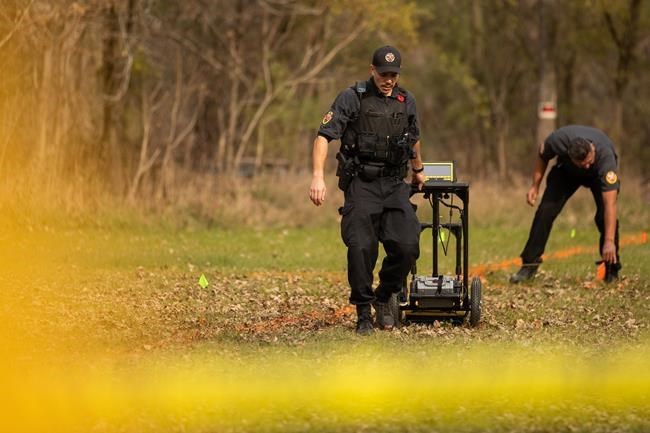OTTAWA — A panel of Indigenous experts says it will not participate in an engagement campaign hosted by an international organization Ottawa hired to provide advice on identifying possible human remains in unmarked graves.
The National Advisory Committee on Residential Schools Missing Children and Unmarked Burials released a statement Monday saying that after giving the matter careful thought, it has decided against involvement in the process.
"While the (committee) is appreciative of a number of changes that have since been made to this agreement, we remain deeply concerned that such an important and sensitive process has been entrusted to a non-Indigenous organization with no prior history of working with residential school survivors," the statement read.
The federal government and the National Centre for Truth and Reconciliation — which serves as an archive for records from the former residential school system — announced the formation of the committee last July. It comprises elders as well as experts in forensics, ground-penetrating radar and archival records.
Months earlier, the Tk’emlups te Secwepemc Nation in British Columbia released ground-penetrating radar findings of what are believed to be more than 200 unmarked graves at the site of a former residential school, sparking widespread outcry.
Other First Nations across Western Canada have since announced similar discoveries, and last fall the federal government signed a contract with the Netherlands-based International Commission on Missing Persons to engage with communities on identifying possible remains.
The national advisory committee raised concerns about the agreement around the time it was announced, as did an outside official whom the federal government has appointed to serve as an independent interlocutor tasked with developing policy around how to better protect lands that are home to unmarked graves.
Issues have arisen about Ottawa tapping a non-Indigenous organization to speak to communities about options when it already has Indigenous experts and residential school survivors doing similar work.
The advisory committee says in its statement that it supports Indigenous families and communities seeking technical support from whichever organization they choose.
"However (the committee) feels strongly that a federal engagement process aimed at developing a common national strategy on DNA, identification, and repatriation for residential schools missing children must do more than simply employ Indigenous staff," it read.
"It must be Indigenous-led and survivor-led to ensure that no further harm is done."
The director-general of the missing persons commission told The Canadian Press in February she wants its work to be given a chance. Kathryne Bomberger said in an interview the body was first contacted by members of a Cree community as well as northern Manitoba NDP Niki Ashton, leading it to eventually submit a proposal to the federal government.
The organization previously worked in Canada to help identify the remains of those killed during the Lac-Megantic rail disaster in Quebec in 2013. Through its $2-million contract with Ottawa, Bomberger has said, the commission would provide Indigenous communities with possible options to identify remains believed to be in unmarked graves and report to Ottawa on what it has heard.
This report by The Canadian Press was first published May 29, 2023.
Stephanie Taylor, The Canadian Press



